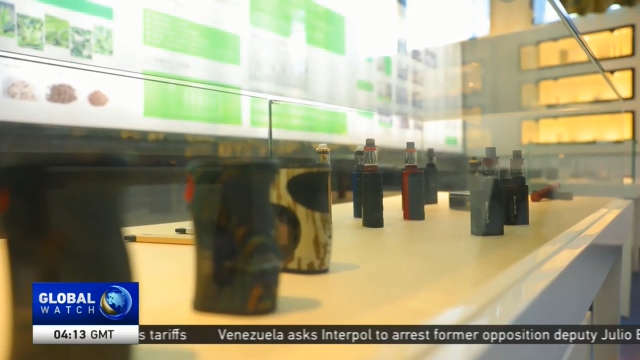
13:04, 11-Aug-2018
China-US Trade Tensions: US tariffs on the product may hurt American consumers
Updated
12:45, 14-Aug-2018
02:56

One product targeted by the Trump administration's tariffs on Chinese imports: e-cigarettes. But few people know that the Chinese-made kind is the only market-viable option for tens of thousands of American distributors and sellers. So who will hurt the most from e-cigarette tariffs? Cui Hui'ao visits one manufacturer in the southern city of Shenzhen to find out.
This company in Shenzhen, Guangdong Province, produces raw material for e-cigarettes. Every day, nearly 1 million bottles of the so-called e-liquid are produced in this workshop, the vast majority of which is exported to countries the US, UK, and Italy.
YAO JIDE CHAIRMAN, HANGSEN "The domestic market accounts for less than 6 percent of our business. Our products are very popular abroad."
Conceived as a way for addicted smokers to wean themselves off "the habit", e-cigarettes have become increasingly popular with young users across the world, especially in the US.
CUI HUI'AO SHENZHEN "Roughly 90 percent of the world's e-cigarettes are made in China. And nearly all of those products are produced right here in Shenzhen before getting shipped overseas. Now, with the potential tariffs, extra costs will likely funnel down to American e-cigarette consumers."
Yao says behind China's overwhelming share of global e-cigarette production, are its advantages in labor costs, technology and its comprehensive supply chain.
YAO JIDE CHAIRMAN, HANGSEN "It would take at least three to five years to shift the industry elsewhere. At this point, China is the only source for American distributors. They would have no choice but to raise prices for users if tariffs go into effect."
Aside from the strong demand, as Vice Chairman of the China E-cigarette Association, Yao is also confident that the impending tariffs on e-cigarettes and vaping devices would not destroy Chinese manufacturing.
YAO JIDE CHAIRMAN, HANGSEN "We own the IP. In total, Chinese manufacturers own more than 20,000 intellectual property rights on e-cigarette products."
To that point, at the recent hearing on section 301, the US Department of Commerce asked an American distributor if they could force Chinese suppliers to transfer their IP to another country.
SUN LEI DENTONS, PARTNER "What are you doing? You are accusing the behavior of China to force the transfer of IP but you are doing this. How can I do that? Then, there is silence. There is long-time silence."
In 2017, the US imported 300 million US dollars worth of vaping devices from China - an almost 280 percent increase from the previous year. The fast-growing market for the product means if this trade war continues, it will hurt consumers and the industry as a whole. Cui Hui'ao, CGTN, Shenzhen.

SITEMAP
Copyright © 2018 CGTN. Beijing ICP prepared NO.16065310-3
Copyright © 2018 CGTN. Beijing ICP prepared NO.16065310-3